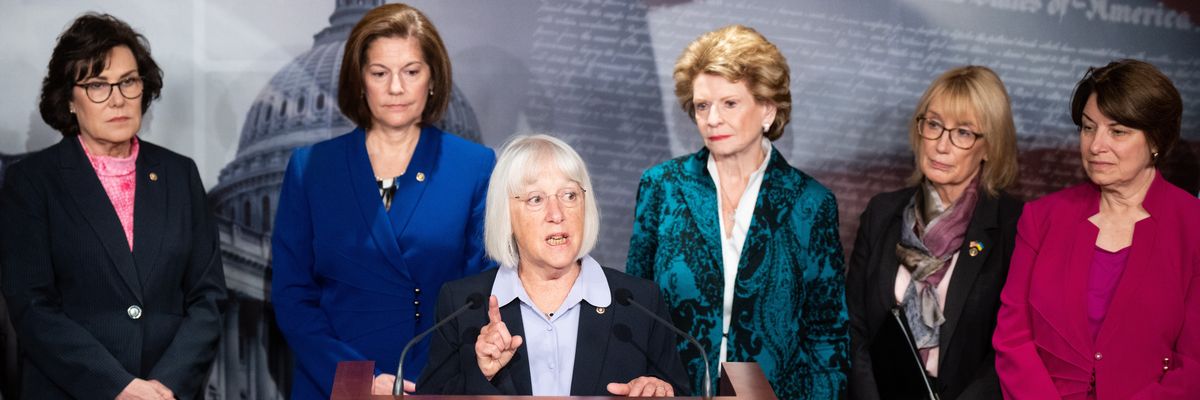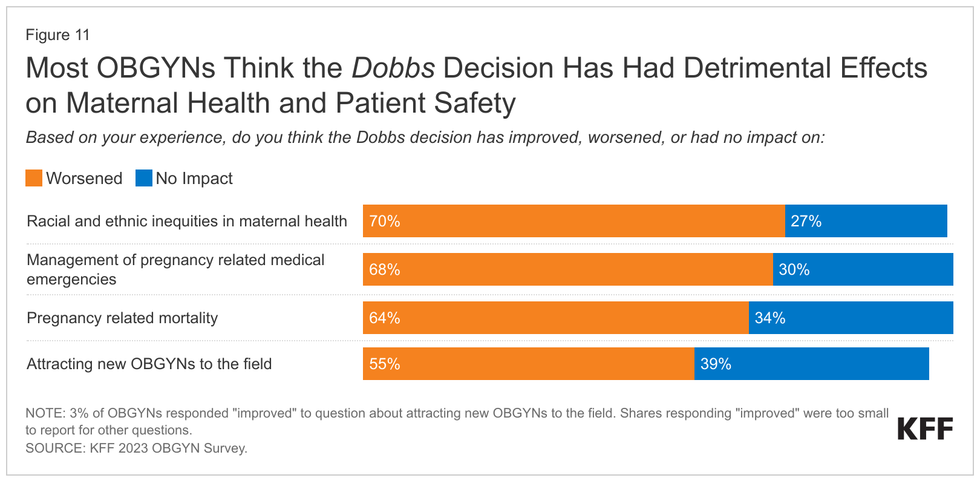Pro-choice Democrats in both chambers of Congress took steps to protect and expand reproductive rights across the United States on Wednesday, nearly one year since the U.S. Supreme Court's 6-3 ruling in Dobbs v. Jackson Women's Health Organization.
Almost a half-century after the high court affirmed the constitutional right to pre-viability abortion with Roe v. Wade, right-wing justices reversed that position last June, further fueling relentless attacks on reproductive freedom at all levels of government.
Led by Sen. Patty Murray (D-Wash.), Senate Democrats on Wednesday afternoon attempted to pass by unanimous consent what they called "four commonsense bills to protect women's fundamental freedoms."
- The Right to Contraception Act (S. 1999)—which would codify the right to access and use contraceptives, and healthcare professionals' ability to provide birth control—was proposed by Sen. Ed Markey (D-Mass.) and blocked by Sen. Mike Braun (R-Ind.).
- The Freedom to Travel for Health Care Act (S. 2053)—which would prohibit interference with the ability to access out-of-state reproductive healthcare—was proposed by Sen. Catherine Cortez Masto (D-Nev) and blocked by Sen. Mike Lee (R-Utah).
- The Upholding Protections for Health and Online Location Data (UPHOLD) Privacy Act (S. 631)—which would protect the privacy of personally identifiable health and location data—was proposed by Sen. Amy Klobuchar (D-Minn.)—and blocked by Sen. Cindy Hyde-Smith (R-Miss.).
- The Let Doctors Provide Reproductive Health Care Act (S. 1297)—which would ensure the right to provide reproductive healthcare services—was proposed by Sen. Debbie Stabenow (D-Mich.) and blocked by Sen. Ted Budd (R-N.C.).
After the Republicans prevented passage of the four proposals, Murray, the Senate assistant Democratic leader, said that "none of these should be controversial" and slammed the GOP objections as "shameful."
Ahead of the attempts to advance the legislative package, the senator stressed that "every day, women across our country are confronting a dystopian reality: one where Republican politicians have the final say in their healthcare decisions."
"Women are forced to stay pregnant against their will—even when their health and lives are at risk, doctors in some states are having to deny patients the lifesaving care they need or risk being sent to jail, and other providers—in states like mine—are being pushed to the breaking point trying to serve an influx of patients from out of state," she noted. "The fallout has been devastating."
KFF survey results released Wednesday show that OB-GYNs across the United States say Dobbs has majorly impacted care, with providers reporting cases in which patients were unable to obtain an abortion they sought and faced constraints on the management of miscarriages and pregnancy-related medical emergencies.

"Large shares of OB-GYNs believe that the Dobbs decision has also exacerbated pregnancy-related mortality (64%), racial and ethnic inequities in maternal health (70%), and made it harder to attract new OB-GYNs to the field (55%)," KFF said.
As Molly Longman wrote for Cosmopolitan on Wednesday: "In the year since the Supreme Court plunged reproductive rights into chaos with its decision on Dobbs, a lot has gone down—much of it dismaying, dangerous, vile, problematic, and…dare we say…shitty. Alongside the devastation, though, there have also been hopeful developments, which prove that when people are unwilling to give up the fight, there is room for light, possibility, and collective power."
Longman cataloged "all the major milestones you should know," from "shitty" developments such as GOP-led states enacting abortion bans and U.S. Sen. Lindsey Graham (R-S.C.) proposing a nationwide 15-week ban to "hopeful" moments like Kansas voters rejecting an anti-abortion amendment and governors in several states taking action to protect patients and providers.
In the U.S. House of Representatives—narrowly controlled by Republicans—a trio of Democratic congresswomen on Wednesday moved to force a vote on the Women's Health Protection Act (WHPA), which would restore the right to access abortion care nationwide.
Rep. Judy Chu (D-Calif.), who authored WHPA, along with Congressional Pro-Choice Caucus Co-Chairs Diana DeGette (D-Colo.) and Barbara Lee (D-Calif.) filed a discharge petition for the legislation. If the petition receives 218 signatures, the bill must receive a floor vote, despite any objections from chamber leadership, including House Speaker Kevin McCarthy (R-Calif.).
"With House Republicans beholden to their extreme MAGA members, they refuse to restore and strengthen Americans' reproductive rights," said Chu. "I am beyond proud to work with House Democratic leadership and the Pro-Choice Caucus to offer the Women's Health Protection Act in a discharge petition to force accountability for their inaction. House members who do not add their signature are telling Americans that they shouldn't have the freedom to make their own healthcare decisions."
The developments on Capitol Hill came as advocates are preparing to mark the official one-year anniversary of Dobbs on Saturday with demonstrations across the country.
"We know there is power in numbers, and together we will send an unmistakable message that Roe may have fallen, but we are still fighting, and we won't stop until we win!" say organizers, including All Above All Action Fund, National Women's Law Center, NARAL Pro-Choice America, Planned Parenthood Action Fund, Ultraviolet, and Women's March.
Members of the Biden administration are also speaking out this week. Vice President Kamala Harris on Tuesday night was featured in an MSNBC special about Dobbs, during which she said that "this issue is so fundamentally about freedom."
First Lady Jill Biden on Tuesday hosted a White House conversation about Dobbs. While assuring those in attendance that President Joe Biden "is doing everything he can to fight back," the first lady also emphasized that "the only way we can ensure that every woman has the fundamental freedoms she deserves is for Congress to make the protections of Roe v. Wade the law of the land once again."
U.S. Health and Human Services Secretary Xavier Becerra on Friday plans to visit a Planned Parenthood clinic in Fairview Heights, Illinois, where abortions are still legal, then head to a facility 20 minutes away, in St. Louis, Missouri, where abortion is now illegal.
That's according to Axios, which noted that the latter clinic is "where Becerra was giving remarks last year when the Dobbs decision dropped." This year, the secretary's roundtable and press conference will focus on the "tale of two states," and the impact of last year's ruling throughout the country.





